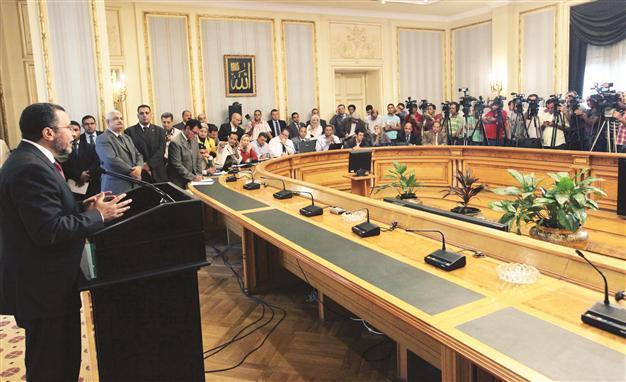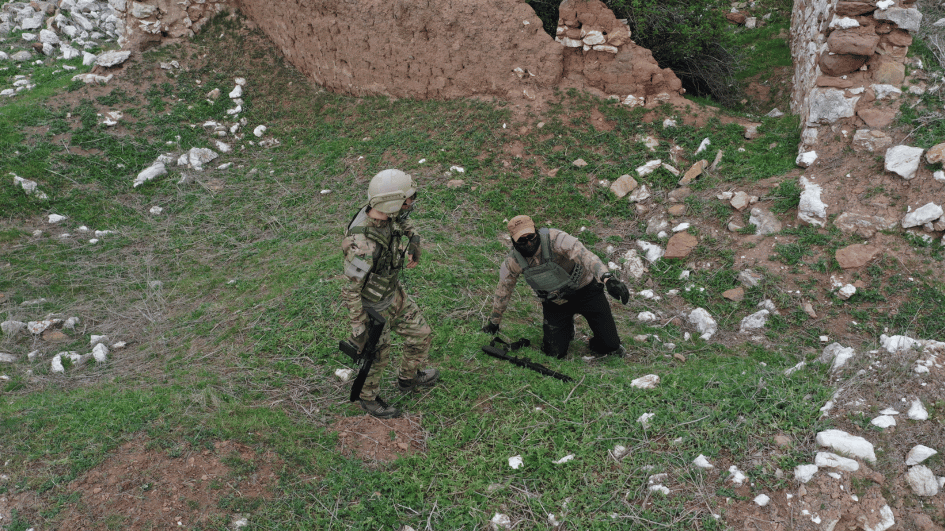Egypt cabinet sees slim Brotherhood presence
CAIRO

Hisham Qandil (L) speaks during a press conference in Cairo. The Cabinet, formed more than a month after President Mohamed Morsi took office, reflects the precarious balance of power between Morsi and the military, which had ruled the country before Morsi took office. Mubarak’s defense minister will retain his post. EPA photo
Egypt’s Prime Minister Hisham Qandil unveiled a new 35-member Cabinet yesterday. The ruling Muslim Brotherhood and their allies have at least five posts, slightly weak representation when compared to this year’s parliament elections that put the group in a dominant position. Military chief Field Marshal Hussein Tantawi has also been retained as defense minister.The Cabinet, formed more than a month after President Mohamed Morsi took office, reflects the precarious balance of power between Morsi and the military, which had ruled the country before Morsi took office. Qandil’s designate is describing new Cabinet as the “people’s government” and has called on Egyptians to unite in the face of “grave” challenges, The Associated Press reported. Hisham Qandil confirmed that Hosni Mubarak’s defense minister of 20 years, Field Marshal Hussein Tantawi, would retain his post.Tantawi led the military generals who took over from Mubarak when the president stepped down after a popular uprising last year.
Finance Minister Mumtaz al-Said, who served in a military-appointed government, will keep his post, even though Morsi’s Muslim Brotherhood had strongly opposed his budget. The Brotherhood’s Freedom and Justice Party took at least five cabinet seats including the Information Ministry, which regulates the media and education. Qandil, a self-described devout Muslim whose appointment dismayed Morsi’s secular election allies, said he chose the ministers based on their competence. “The main criterion, was competence,” he said. Qandil said several members of the outgoing, military-backed government would retain their posts, including the foreign and finance ministers.
‘Enormous’ challenges
He said the Cabinet would comprise 35 ministers, including eight ministers of state, and will have to tackle the “enormous” economic and security challenges facing the country since Mubarak’s overthrow.
Qandil maintains that he has no formal links to any of the country’s Islamist political parties. Morsi, who campaigned on reviving Egypt’s economy and quickly restoring its deteriorating security, is eager to push through his program with a technocratic government, his aides said. But he must still contend with the military, which has been historically suspicious of the Islamists, and which controls the budget and retains legislative authority after a court ordered the Islamist-dominated Parliament to disband in June.
NEW SECTARIAN VIOLENCE
New sectarian violence erupted in a village near Cairo Aug. 1 following the death of a Muslim man, prompting all the local Christians to flee, church and security officials said.
The violence in Dahshour, south of Cairo, is the first case of sectarian clashes in the weeks since Mohammed Morsi of the Muslim Brotherhood took over as president.
Security officials said police fired tear gas at Muslims who were trying to set fire to the local church. The rioters, who were returning from the burial of a Muslim man who died in the clashes, damaged several Christian properties and set three police trucks on fire. Sixteen people, including 10 policemen, were injured, said the security officials.
















